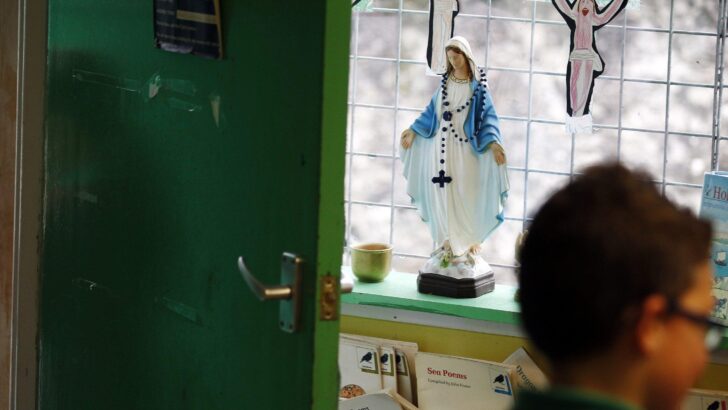Most TV services have a rake of channels down the list that few people ever watch. Most are happy with the Irish channels and the main UK services like BBC, ITV and Channel 4. But good stuff often lurks far down the list – eg Sky Arts and PBS America. Both are home to excellent documentaries.
When I saw a listing for The Good Nazi (PBS America, Thursday) I was taken aback. I had recently been on a visit to Dachau concentration camp and so, ‘good’ and ‘Nazi’ clashed horribly.
Reminiscent of the Oscar Schindler story, this was the story of Karl Plagge, a German army officer who was assigned to run a work camp in Vilnius, Lithuania. Horrified by the atrocities he saw being perpetrated on the Jewish population, he set about protecting as many as he could – e.g., pretending they were mechanics for his workshop.
Plagge felt guilty as, on one occasion, when he thought all were safe, he visited his family in Germany. The SS took the opportunity to violently round up the children when the men were out at work. Some children who made it to the hiding places survived.
One, who was 10 at the time and survived what was known as the ‘child capture’ or ‘Kinder Action’, described mothers crying for days. Later when there was the ‘final action’ as the Soviet Army approached and the Nazis tried to cover up their dirty work with more of it, he described hearing crying, screaming, shooting and then silence.
Plagge was tried for war crimes but acquitted when survivors from his camp testified on his behalf, but his godson described how he fought against acquittal because he didn’t feel innocent.
The programme also featured efforts by modern researchers to locate hiding places and mass graves using high tech ground imaging devices. The highly dramatic music and to a lesser extent the dramatisations were unnecessary, but, overall, the impact was strong – in an especially emotional moment researchers and survivors gathered for prayer on the grounds of the former work camp.
In other news, Newstalk Breakfast (Wednesday) raised the question: ‘Does a Catholic ethos still have a place in our schools?’ This was prompted by the recent report on the state of Catholic education in Ireland. Presenter Ciara Kelly outlined some findings – half the primary teachers not believing in God, less than half practicing the Catholic faith, though 90% of schools are supposed to be Catholic.
Alan Whelan, President of Catholic Secondary School’s Parent’s Association was not surprised at the findings but thought bishops and trust bodies should be ashamed of the way things had deteriorated and was surprised there weren’t resignations. He asked the rather urgent question – how can non-believers prepare children for the sacraments?
Jillian Brennan of the Humanist Association also had concerns – that teachers were being forced to teach religion, which didn’t align with their personal values. She thought divestment was moving too slowly, and wanted religion taught outside of the school day.
Children could be taught good values and morals based on things like kindness, empathy and critical thinking. I suspect this would also involve imposing things like controversial and contested gender theory on students, which very likely would not ‘align’ with parents’ values, and they, as Alan Whelan pointed out, are the primary educators.
Drivetime (RTÉ Radio 1, Wednesday) also tackled the report, but from a different angle – they spoke to Dr Daniel O’Connell of Mary Immaculate College in Limerick, principal investigator on the report. He found that much of the work on ethos in Catholic schools was by older staff members, with the younger ones not understanding ethos as clearly.
There was an urgency for patrons to invest more in schools’ understanding of ethos, but also for more divestment as dioceses weren’t equipped to resource all the existing Catholic schools. The schools scored highly when it came to environment, respect and caring for the poor, but younger teachers were more hesitant when it came to the issue of knowing Jesus. There wasn’t enough about the wishes of parents, but most teachers were happy to work in Catholic schools.
On a related topic, on Oliver Callan (RTÉ Radio 1, Wednesday), the host referred to the Church controlling 90% of the primary schools, and “disastrously” the sex education programme – a cheap shot, I thought, and thoroughly one-sided – using a privileged position in state funded media to push personal agenda?
PICK OF THE WEEK
SONGS OF PRAISE
BBC One Sunday, May 5, 1.15pm
Pam Rhodes celebrates the 75th Anniversary of one of the world’s most cherished hymns, How Great Thou Art, and explores the remarkable story of its composition.
MARCH FOR LIFE CANADA
EWTN Thursday May 9, 4.30pm
Thousands of people descend upon Ottawa’s Parliament Hill as EWTN provides complete coverage of the annual National March for Life, Canada’s most significant pro-life event.
EVERYBODY LOVES RAYMOND
Channel 4 Friday, May 10, 7.45am
Debra’s hippy sister shows up unexpectedly and announces that she’s decided to become a nun.


 Brendan O’Regan
Brendan O’Regan A student is pictured in a file photo walking past a statue of the Mary at a Catholic school in Cushendall, Ireland. Photo: OSV News photo/Cathal McNaughton, Reuters
A student is pictured in a file photo walking past a statue of the Mary at a Catholic school in Cushendall, Ireland. Photo: OSV News photo/Cathal McNaughton, Reuters